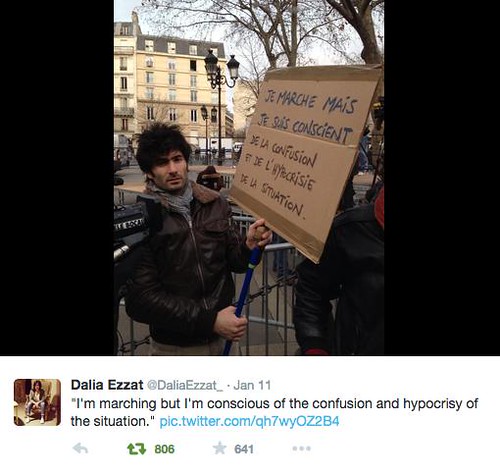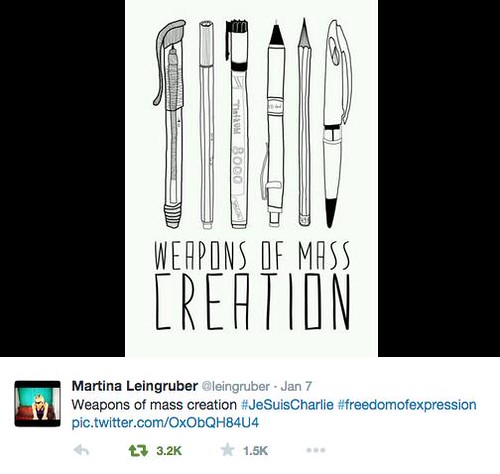The following post is an excerpt from this week's Mom.me column.
Moments after the news of Charlie Hebdo hit my screen, I felt the need to do something. #JeSuisCharlie was already trending and writers and artists and free-thinkers I admired and respected were posting photos of broken pencils come to life... which moved me deeply and made me want to rise up with all the other pencils and sharpen... I retweeted a picture of pens in a row. "Weapons of Mass Creation," it said and sat down to think about what that truly meant.
What do we create with our words? With our pictures? With our photographs? What do we build with our voices? Who do we rally behind? Antagonize? Support? Stand with? Listen to? Epitomize? For those of us who spend the bulk of our lives creating, who is our audience? And why?
The more I though of my retweet, the more I realized how much more thinking I had to do before I hashtagged anything.
My heart was broken for those viciously massacred. It still is. I mourned for Paris then and I mourn for Paris now. I also mourn for Nigeria and our all-to-violent world. I abhor violence of any kind and believe with my whole heart in peaceful protest, in joining hands and marching for PEACE. For everywhere and everyone. I believe in creative freedom and a world without censors... I believe that creative expression is a basic human need -- that storytelling is our greatest asset as a species...
I must show my solidarity to a magazine of free-thinkers because I am a free-thinker, too. Because without free speech I am nothing. We, as humans, are nothing. And yet... without free thought, we are even less.
Earlier this week, Saladin Ahmed (New York Times) wrote the following:
Why don't I feel like one of the good guys? Why do I, instead feel like part of the problem? From where I stand, I see one way and from where others stand, they see something else. And when we all march together in a line in the same direction, what does that mean? What does it mean when we ignore atrocities elsewhere, without calling ourselves Nigeria, for example, (#naijanimi) and when we ignore that we, the so-called "Good Guys" are seen as terrorists in many parts of the world?
But we're the good guys!
We don't have time to really think about it. We don't want to have the time. Nuance complicates everything. Nuance makes superheroes less heroic and humanizes villains. Nuance forces us to look in our cultural mirrors and recognize that nobody is innocent.
Nobody.
We don't have time to ask ourselves these questions and we refuse to look in the mirror. Instead we follow the mob. We take the signs we are handed and we go into battle. That is how wars have always been fought and won.
But at what cost? And who is the general? Who are we fighting? And why do they want to fight us? The answers will never be clear to us because we are over here. We are in our homes, in our cities, in our skin, in our own experiences.
We lose our ability to respond to atrocity when we start seeing people not as individuals, but as symbols. Changing avatars on social media is a pathetic distraction from changing realities in society. To combat violence you must look unflinchingly at the concrete inequities and practices that breed it. You won’t stop it with acts of self-styled courage on your computer screen that neither risk nor alter anything. To protect expression that’s endangered you have to engage with the substance of what was said, not deny it. That means attempting dialogue with those who peacefully condemn or disagree, not trying to shame them into silence.
"Shhhh. Don't ask questions. Here's a quote from Voltaire that isn't really Voltaire. Here.... take it. It's good... and don't ask questions."
But...?
Wait.
I don't care that Voltaire didn't actually say this, it's still a noble sentiment. But it's also woefully false. Maybe not for everyone, but for most, I believe it false. Are we really willing to fight to the death to protect a person's right to use racial slurs and threaten rape in comments sections? I'm not. I do not want to fight to the death so that people, friends, even strangers, may be shamed and/or threatened. Do you?
Growing up, the kids on the playground used to say, "It's a free country!" in order to defend their words, their actions... regardless of how cruel they were.
"I can say whatever I want to say to you, okay? It's a free country."
And they were right. But they were also very wrong.
Nothing is free. Everything comes with and at a cost. If not to me or you, to someone...
The cold doesn't bother me anyway.
Censorship is not for governments or world leaders. It is not something we should be "bullied into doing." It is, however, something we must be mindful of when it comes to our OWN words and phrases and pictures. Knowing how and why and when to self-censor is crucial. It isn't "cowardice" to censor what we know will sting another. It's empathy.
You can read the rest of the post, here...
GGC




0 comments:
Post a Comment